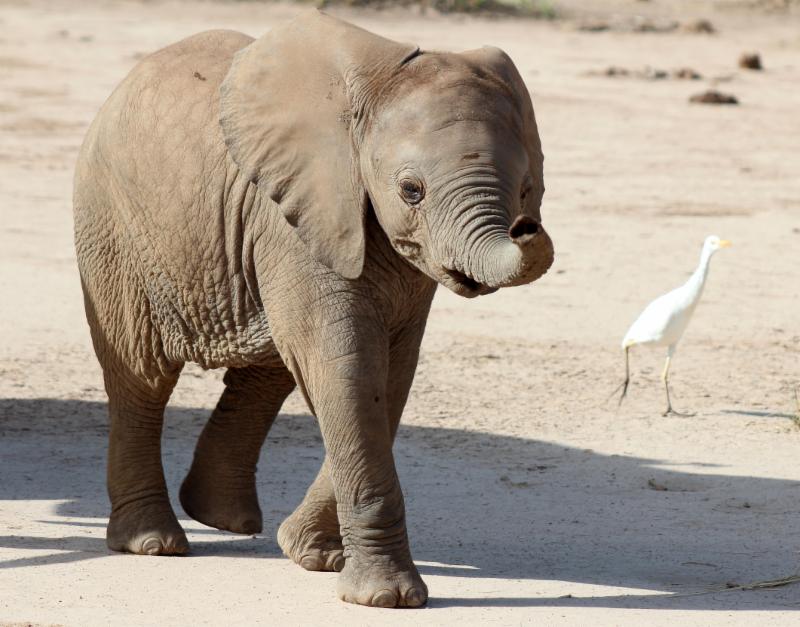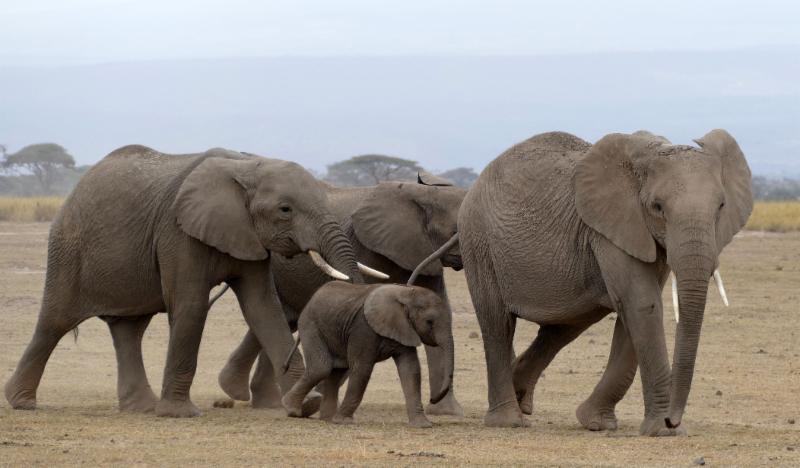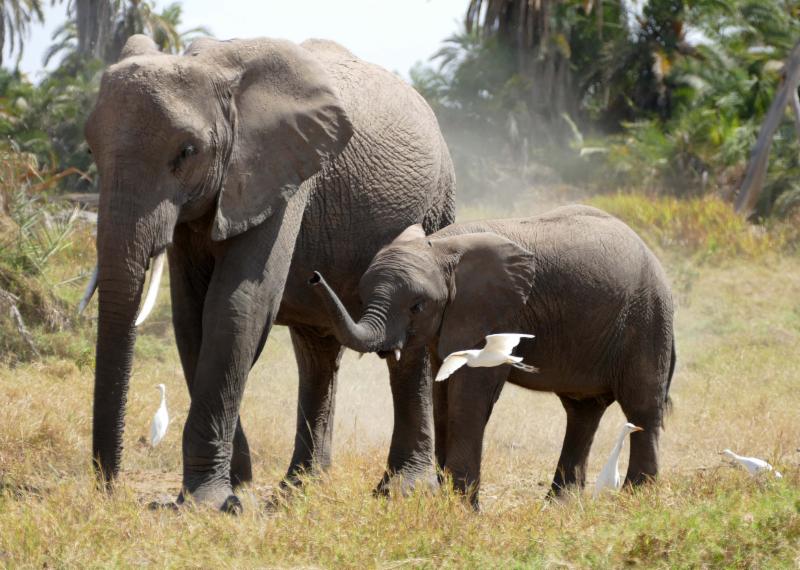
This is Amora. Help us keep her world safe.
|
|
Ringling Bros. and Barnum & Bailey Cricus Closes its Doors
|
According to Feld Entertainment, Ringling Bros. and Barnum & Bailey Circus will close its doors for the last time in May 2017 after 146 years in operation. The closure is attributed to a decline in ticket sales and public attendance at Ringling performances and to ongoing protests over the circus's use of elephants in "entertainment."
Indeed, elephants made their last appearance in the Ringling show in May 2016, after decades of animal welfare protests across the US. Animal activists objected to the elephants' captive situation, which included travel in hot train cars; the use of bullhooks and chains to control and "train" elephants; and the mandatory "tricks" that were both dangerous and demeaning to the elephants who performed them.
We are cautiously optimistic that the Ringling closure will lead to a dramatic decline in the use of animals in entertainment, as other smaller circuses follow Ringling's example and abandon the use of exotic animals.
|
|
|
Devastating News from Gabon
Along with many others, we were horrified at the publication of a study from Minkebe National Park, long considered a stronghold for forest elephants. Surveys showed an 82% population loss in ten years, representing 25,000 forest elephants. The study's authors estimate between 6,000 and 7,000 survivors remain. It will take them many years to recover.
The Gabonese government has created more protected areas than any other range state in recent years, but this is devastating proof that without enforcement even large populations are vulnerable.
Massive ivory seizures in recent years have been traced to Central Africa thanks to genetic techniques. Now we know where a lot of that ivory was coming from.
If you want to help, make sure you continue to sign all petitions for domestic trade bans. Since we cannot rely on CITES to protect elephants, we must tackle it country by country instead.
|
Sylvi Nyamburu is our Project Administrator and also the "mother" to all of our students, which is quite a significant job since we are currently sponsoring 18. Timothy Tetu is our most recent graduate and Sylvi attended both his graduation and his celebration party at his home in Amboseli. Here is her report:
Timothy graduated with a second class honors (upper division) degree in Bachelor of Commerce with a Finance option. [In the British system this is a very good result.] I was privileged to attend his graduation ceremony, which was held at his home in Lengism, Amboseli. His peers came in large numbers to celebrate this day with him. You could see them looking at him with envy as the proud Timothy stood to say: "It is possible to have an education as a Maasai man or woman and even do better than I did." He encouraged them not to drop out of school. Timothy has been one of our most committed students and it has been such a joy to work with him.
|
|
New Elatia Family
|
|
|
We are excited to introduce the GB Family to our Elatia program. This is a large and captivating family, which we know all elephant lovers out there will want to get to know and follow.
Join the GB Family Now
|
|
Thank You
|
|
Our donors have been very generous these past few months. Without you we could not stay in the
field; we could not continue to follow the lives of the elephants we know and care so much about. In Kiswahili we say: ASANTE SANA.
Doug Aja
Jane Beckwith
Costigan Family Charitable Trust
Anne M. Cusic
Denison Family Foundation
Detroit Zoological Society
Lavinia Dimond
The Elephant Sanctuary
Fair Play Foundation
Dorothy and Howard Fairweather
Leila Saidenberg Furman
Katja Gist
Cathy Grellet and Fred Smith
Cynthia Jensen
Kerr Family Foundation
Knox Family Foundation
Jill Korpita
Leanne Lachman
Lynne Leakey Revocable Trust
John Madigan
Roy March
Sascha and Stacie Matschinsky
Gordon R. Ray Family Charitable Fund
Gary and Kathleen Rogers Family Foundation
Rolf and Elizabeth Rosenthal Family Foundation
Rouse Family Charitable Trust
Carl Safina
Richard Stanley
Larry Strear
Tembo Preserve
John Watkin and Anthony Greg Fajardo
|
|
Ways to Support Us
Follow a Family in Amboseli with Elatia

Following the lives of
an e
lephant family is endlessly fascinating. We wanted to share this experience with our supporters and so we started a program called Elatia. You can follow the lives of one or all six of Amboseli's Elatia families. For only $30 per year you will receiv
e regular updates of stories, photos and videos of your family.
To learn more about Elatia
go to
This Link.
If you have any problems, Tal has made a tutorial for signing up,
Click Here.
You can also contact her directly if you have any questions on:
**********
Name a Baby Elephant 
All the elephants in Amboseli are named once they reach four years old. Before that calves have code names based on their year of birth and their mother's name. In this photo the mother is Kiddo who was named by a donor when she was a calf. Now someone is naming Kiddo's calf.
Unlike our Elatia program where many people follow the same family, our naming program is a unique experience. The calf becomes "your" calf and yours alone and the name you give forms a part of the Amboseli dataset for all time. For more information write to us at: [email protected]
**********
iGive
One of the ways you can support ATE is by making your online purchases through iGive. If you sign up the Amboseli Trust for Elephants as your recipient organization we will get a small percentage of the sale. Connect with iGive.
**********
Give a Gift that Lasts Forever
Designate the Amboseli Trust for Elephants as a beneficiary of your will, individual retirement account, or life insurance policy.
To learn more about planned giving opportunities, please contact:
Betsy Swart
|
|
|
News from the Amboseli Trust for Elephants
January - February 2017
|
Parts of Kenya are going through a devastating drought, but for a change Amboseli has been spared. We received some unexpected rain in January and February, not a lot, but just enough to bring up some new grass.
It's hard to describe to people living in high-rainfall countries how much rain means to us. Amboseli, in the shadow of Kilimanjaro, receives only about 320 mm (12.5 inches) of rain each year. But, and this is a big but, Amboseli has abundant fresh, clean, cool water year round in its central swamps. Underground rivers from Kilimanjaro feed these extensive marshes. Thus the wildlife in Amboseli never dies of thirst. However, hunger is definitely a possibility.
We need rain to grow vegetation. Looking up weather forecasts, watching the sky, getting excited when clouds build up is our daily obsession. I'm always somewhat taken aback when watching a weather person on TV talk about "bad" weather with rain expected somewhere. That would be "good" weather for us. It's all a matter of perspective.
Cynthia Moss
Director
Amboseli Trust for Elephants
|
|
 |
Maasai Olympics - 2016
The Maasai Olympics in Amboseli is one of our favourite events. It brings members of the surrounding group ranches together to compete in a positive way. Instead of showing their prowess by killing lions or elephants they can shine as runners, spear and rungu throwers, or high jumpers.
This was the third Olympics, which are held once every two years. Each time David Rudisha, Olympic gold medalist and world champion 800 meters runner was on hand to give advice and cheer on the participants. David is a Maasai himself and he encourages young men and women to pursue sports.
Maasai from four g
roup ranches form teams and the winning team is awarded a prime b
reeding bull. Also the runner who wins the 1500 meter race is sponsored to participate in the New York marathon.
It's a great opportunity for members of the larger community to meet. We at ATE also enjoy meeting old friends. This year three of our university students who have graduated and have gone on to secure excellent jobs were there and Cynthia was delighted to catch up with them. David Sitonik was in the first group we ever sponsored and now has a high-ranking position is a Kenya government agency. Patrick Papatiti is a liaison for the Chief Whip in Parliament. Joseph Sankale is currently a County Commissioner, but he told us he will be going into politics this year. We are very proud of these young men and pleased that we played an important role in their success.
 |
|
 |
The ATE team with David Rudisha: Tal, Katito, Cynthia, Vicki and Sylvi |
|
|
 |
| Joseph Sankale, Patrick Papatiti, Cynthia & David Sitonik |
 |
|
Advocacy and a Very Special Visitor
We definitely get some interesting visitors coming to see the elephants and the work that we do in Amboseli. Hosting them and discussing our work is an important part of our efforts to advocate for elephants. Our work doesn't exist in a vacuum. We don't just sit and watch the elephants (as pleasurable as that is); we are continuously trying on many fronts to keep elephants in their natural habitats living peaceful, successful lives. T
his means talking to j
ournalists, participating in documentaries, attending conferences and meetings, working with collaborators, writing books and articles, and hosting influential visitors.
|
|
 |
| Cynthia and Ai Weiwei discuss elephants in the research camp |
 |
Most recently we had a
two-day vi
sit from
the most famous conceptual artist living today--the Chinese art
ist a
nd activist Ai Weiwei. (Read about his work HERE.) We were told that our job was to get him to love elephants. Well, it's not difficult to love Amboseli's elephants but we needed luck in findin
g just the right situation for viewing them. The elephants complied. We were able to show him several family groups with small calves and then by something like a miracle we found the most impressive bull in Amboseli--Tim.
Cynthia also sat and talked with Ai Weiwei and his companions in two long sessions. Ai Weiwei turned out to be a delightful visitor who was genuinely interested and asked excellent questions. We don't know if he'll do an elephant-inspired piece but we hope so.
|
|
|
By good luck Tim (right) was in the Park when Ai Weiwei visited and Cynthia was able to take him up close to meet Tim and Teejay. We don't think anyone could fail to be impressed by these magnificent bulls.
|
|
|
Big Lives, Big Data
by Vicki Fishlock
We often joke that we're going to write a book entitled "Elephants Don't Fit in Boxes" about all the ways elephants defy the rules. Even with the advent of sophisticated modelling techniques, it seems that elephant data always violates an assumption or has some structure that makes it plain awkward.
 |
|
 |
The PA family was the largest family at the beginning of the study and continues to be very sucessful |
Of course we wouldn't change this for the world - it's one of the things that keeps us all fascinated about the elephants, but in our role as scientists we are looking for broad patterns in our data, the clues as to how elephant systems work and why changes happen (or don't). Probably the most important thing the Amboseli study has shown is the amount of individual variability that goes into every aspect of elephant life. For instance, the age at which a female has her first calf is around 14 years old in this ecosystem but it can be as young as 10(!) or as old as 17, depending largely on ecological conditions over that female's life but with a large amount of individual variation.
The second "wonderful problem" with the Amboseli dataset is the sheer size of it. Currently we are tracking 1,700 individuals, and have known more than 3,200 elephants since Cynthia and Harvey started work in 1972.
Imagine then our delight when we were contacted by a big data visualisation expert. Pierre Massat was inspired by Carl Safina's book, Beyond Words, (if you haven't read it, you really should treat yourself!) and wanted to know if we had a problem he could work on. It didn't take us long to say yes! Pierre was incredibly generous and donated his time for free and we are all delighted with the results.
Follow the link
HERE to watch the animation. We all love how it captures the temporal dynamics of our population, showing variation in family success (some families go extinct), size and number of independent males. It's visually striking and tells so much of the Amboseli story.
If you want to see more of Pierre's work, his company Mavromatika is
HERE.
|
|
|
In this newsletter there is much more good news than bad news. Nevertheless, the loss of the forest elephants in Gabon is very disturbing. We always thought that country was relatively safe for elephants. It turns out no place is safe, not even Amboseli. The Amboseli elephants are doing well but we can never let up our guard. Poachers would love to come into this ecosystem to kill our big bulls. We and our colleagues are doing everything we can to keep these elephants safe. We still need your help.
|
|
|